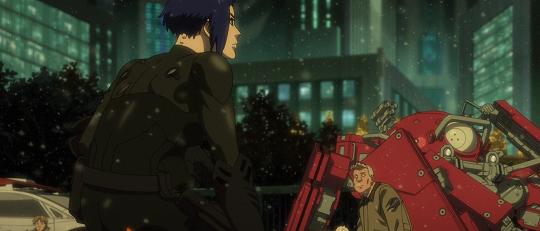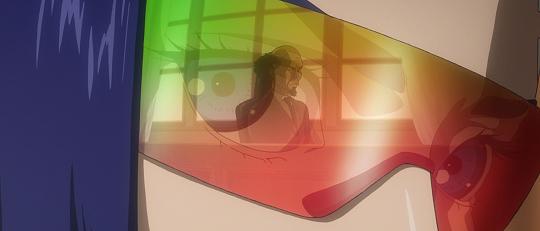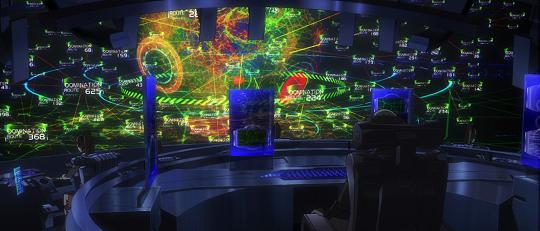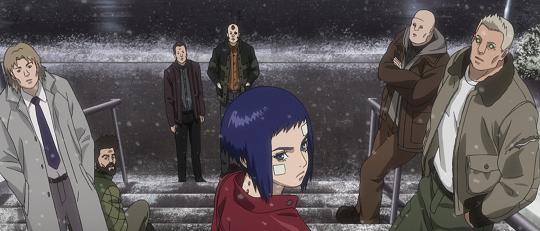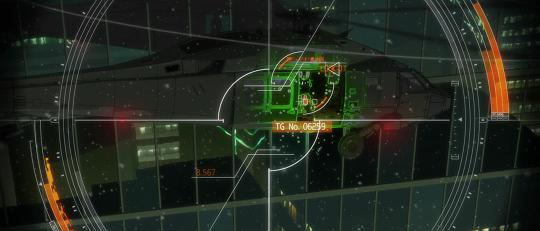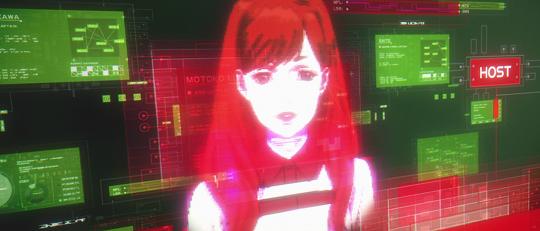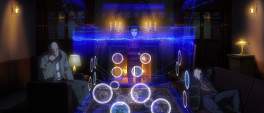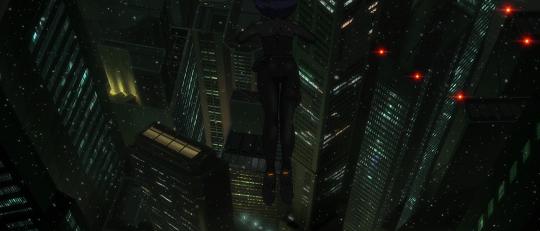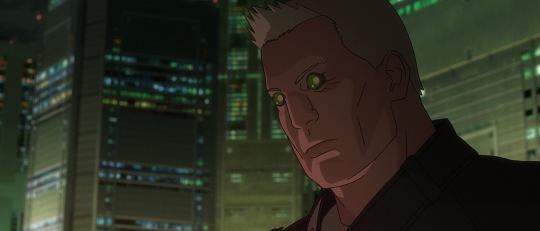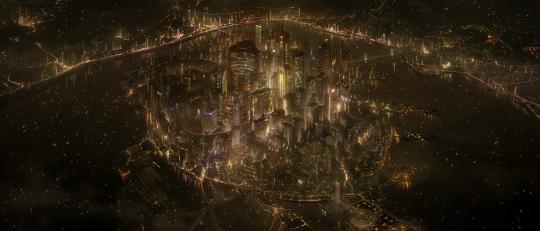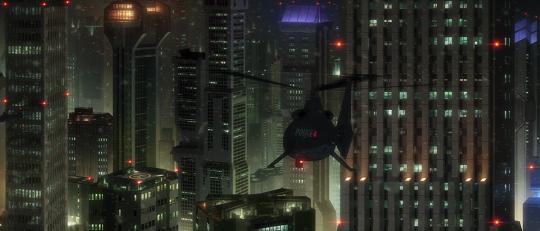I was six when the Ghost in the Shell manga was first released, twelve when the Mamoru Oshii movie was originally released and fifteen when I saw it on Manga Entertainment’s first VHS release of it. Since then there has been second Oshii movie which, like its manga sequel by Masamune Shirow, many people would rather forget happened, and the almost universally well regarded Stand Alone Complex TV series, all fifty two episodes, two compilation movies and an original TV movie of it. That’s an awful lot of history for a franchise and is something that the last two releases of the latest entry, Arise, seem all too aware of.
Ghost Tears and Ghost Stands Alone, despite being initially released in theatres, are episodes rather than movies. At only fifty minutes each they have neither the time nor the isolation that movies do, and one would argue, that Ghost in the Shell as a concept needs. I said before that the first two entries, Ghost Pain and Ghost Whispers, held onto the ideas that run across the franchise:
“The layering of bureaucracy and machinations of governments and individuals in a world that is highly networked and ruthlessly mechanised, and ultimately facing new and increasing challenges because of it.”
That’s an awful lot to cram into only fifty minutes, and it has required some sacrifices that not everyone has taken to kindly.
The most keenly felt is that of characterisation. Despite futile efforts by observers to cram the movies, the TV series, the manga, and now this into a contiguous timeline, this is fundamentally a new telling of the GITS story; the characters have the same names but they’re not quite the identical. Tow Ubukata chooses to abandon the finer details of characters that in previous incarnations were protagonists in their own right - Batou, Togusa, Saito, Borma, Ishikawa et. al. - to focus on the Major and the ongoing conspiracy unfurling around them. In a sense, the writing relies on you having seen all of the previous instalments to appreciate the characters: Togusa is still a hard boiled but dorky family man and Ishikawa still a cyber-hobo; Arise gives you just enough insight to reinforce what you already know while focusing on what you don’t, specifically the new softer, more fallible Kusanagi.
With friends and colleagues scattered in various departments, an active love life and a nagging sense of self-doubt, this is all new territory that is quite unlike her previous confident and capable lone-wolf persona. It’s understandable and contextualised though: being one of the first, perhaps only, humans to have never known a human body, each episode chips away at her story. Be that tales of her undertaking “everyday living” lessons in order to integrate into a society still dealing with the nascent cyborg population, or the unease she feels performing covert operations that switch her from body to body, challenging her identity. It’s classic GITS thematic territory but while Stand Alone Complex dealt with the ramifications on a society that is deeply and inextricably networked, Arise deals with the personal tribulations of cyberisation. What happens when a person is made metal instead of flesh? How does that affect who they are and how they perceive the world?
The third episode, Ghost Tears, peers into how such a process could be used for terrorists means, side-swiping the Methuselah like aging population and the spectre of immortality along with the act of sex when reproduction is now impossible. The fourth episode, Ghost Stands Alone, deals with this by looking at the outliers of the cyberisation process, be that split personality, conjoined twins or the rejection of cybernetic technology whether medical or personal. This is a society that is just waking up to cyborgs - metal-versus flesh, take your human eyes elsewhere - and the perils that brings, specifically here the fallibility of memory and the motivations that inspires. Can people be responsible for their actions if their memories, their very sense of self, has been altered by someone else?
As with any heavy questions, the answers are not straightforward and Arise, perhaps to its credit doesn’t linger too long on them (I’m looking at you GITS: Innocence), content instead to raise them and, if ever so briefly, examine their possible impact. The lack of a hard conclusion to Arise could easily be taken as a flaw, yet its denouement is no different to that of any well paced espionage thriller. Corporations manipulate, organisations retaliate, governments intervene while our cast operate in a moral grey area.
You can’t really see the story of the last two episodes as anything else. A, presumably middle eastern, country ravaged by a civil war then carved up by cartels has its public face making trade deals with a country that played a large part in its devastation. Story threads curve and twist with dizzying regularity as military officers, political leaders and multinationals manoeuvre around each other peeling away the different plot layers. Amidst this is a tangible sense of post-war fatigue and paranoia, whether it’s Borma’s throwaway line about getting fully cyberised on the battlefield or the Major’s almost total rejection of joining Section 9 under Aramaki, concerned that she’ll be subverted and altered to suit the government’s needs.
They should be paranoid though, the final episode casually throws in the “domination” device that was brought up in the second episode, listening in on calls, hacking into mobile devices and profiling everyone in the area, arresting those who have committed no crimes, all under the guise of public security. This is a Ghost in the Shell story that is all too aware of the society that it is being shown in and, doing what science-fiction does best, illustrating what it could become. So for every mention of a virus being a “Stuxnet” type, there’s the lingering threat of state sponsored cyber warfare; for every data line tapped and traced there’s the backlash against the security services’ indiscriminate surveillance lurking underneath.
It’s fascinating and brutally topical but in the rush to cram as much as they can into this four episode (and an upcoming movie) series, Arise feels like a Ghost in the Shell themed rollercoaster. There are the loops and spirals when bullets fly and multipedal tanks run riot, there are the climbs as disparate plot pieces are scattered around, and there are the sporadic quiet moments, when all the exposition comes tumbling out. Often happening all at once, with one particularly memorable scene seeing Batou and Kusanagi cartwheeling around enemies while discussing the minutiae of the ongoing conspiracy. It’s exhilarating and satisfying while it lasts, but the lack of breathing room around the subjects means that although a lot of what made GITS brilliant is in there, it’s too densely packed.
The “Standalone” episodes of Stand Alone Complex allowed the series to explore subjects away from the main plot thread of the Laughing Man and Individual Eleven; giving us episodes where the Tachicomas talked about consciousness, or insight into Paz’s cavalier attitude to women, or what happens when religion on cyberisation meet. They slowed things down and sure, they weren’t all as good as one another, but it gave the world, that enticing world of networks and cyborgs and robots, time to breathe.
Arise understands what makes GITS tick, but is hamstrung by its format. That doesn’t stop it trying to relive the glory days of the past though. Whether it’s the now iconic thermoptic camouflage fall from a rooftop to the glue gun versus tank to diving with a body that could sink like a rock. These scenes are augmented of course, tweaked so as not to be retreads, but they underpin one of the key issues with Arise as a whole. Despite the new Major on display, there is discord between what you know from the series past and what the series new expects. All of the prior entries have had memory alteration as a key part of their ethos, yet it’s not until what feels like the eleventh hour that we find out here that it is still evolving technology in this timeline. Ghost dubbing may play a key role in these last two episodes yet it’s only in one of those standalone episodes of SAC that the technology is elaborated on. Conversely infiltration keys play a huge part here (if you count Batou routinely punching himself in the face) but are an afterthought in other instalments.
What this boils down to then is that I loved GITS Arise for everything it is - flawed, jumbled, rushed and brilliant. It stirred in me the same kind of intellectual curiosity on the philosophical and technological topics it covered as the original movie did when I was fifteen and the Stand Alone Complex series did when I was twenty. I can’t say that about any other anime series. What I found in Arise though is not what everyone was looking for and in a small way I can appreciate others frustrations with the tease that Arise performs. If you loved the Tachicomas (who doesn’t?) then the Logicomas are a poor substitute. If you liked tactical espionage action then there’s plenty here, but with the ultra-dense story interspersing it, it feels disjointed regardless of its slickness. If you liked the Section 9 police-procedural, well, Kusanagi’s team is more vigilante than paramilitary.
I would like a new Stand Alone Complex as much as anyone else, and if we can get a new Mushishi series, perhaps there’s hope yet for one. Until then though, Arise has sated my desire for top tier, thought provoking anime science fiction. I had to work a little harder to like it than previous instalments, but that in no way diminishes its achievements. As someone who liked Solid State Society I look forward to the Arise movie in 2015, and hopefully the conclusion to the Firestarter storyline. Even without it though, it would take a much worse product than Arise to tarnish my, admittedly, slavish fanboy devotion to the GITS franchise.

